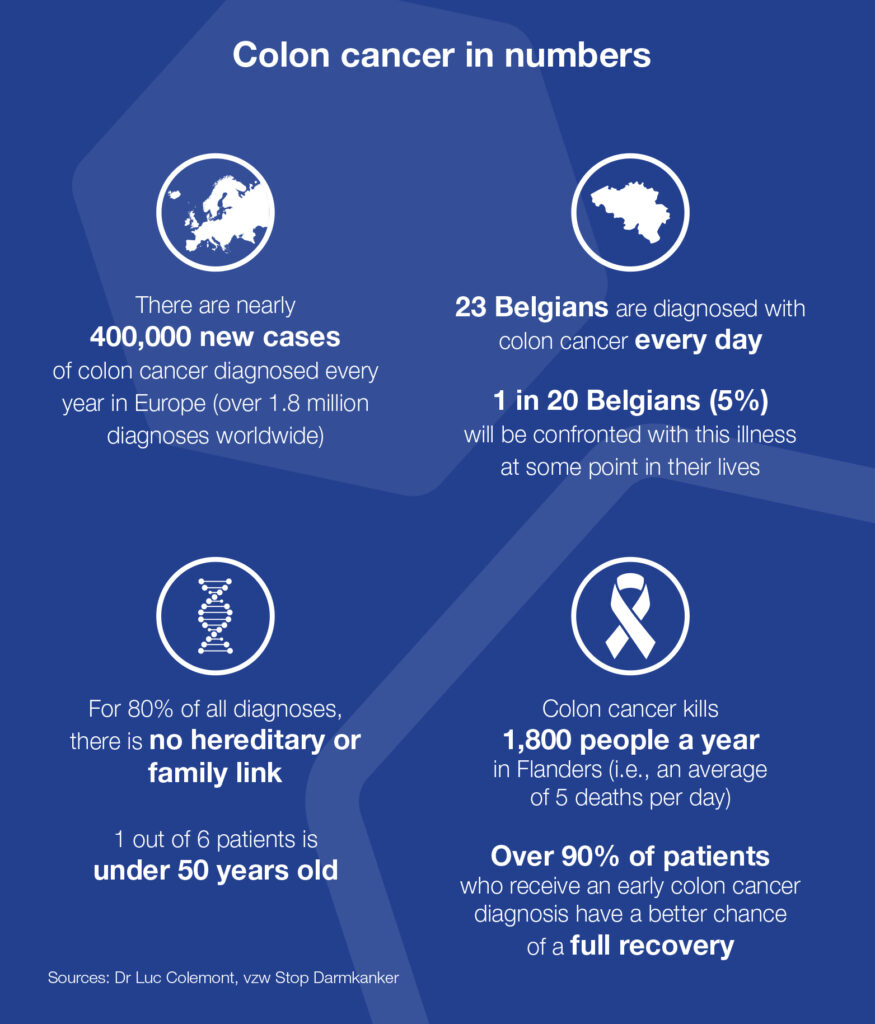an interview with Dr Luc Colemont,
co-founder of vzw Stop Darmkanker
Colon cancer is a serial killer. On average, 23 Belgians are diagnosed with colon cancer and five people in Flanders die from the disease every day.
The goal of Dr Luc Colemont’s non-profit, Stop Darmkanker (Stop Colon Cancer), is to raise awareness, inform, and convince people to get tested for colon cancer in good time. Why? If the disease is discovered early, there is over a 90% chance of a full recovery.
Creative activist
“Luc Colemont calls himself a creative activist for the cause. With a career of over 28 years as a gastroenterologist, he knows colon cancer better than most. In his work, he has been confronted at every turn by the suffering this disease inflicts on people and the environment: ‘Every week, over 160 people in Belgium are diagnosed with colon cancer, and more often than not, they’re at an advanced stage.
As a doctor, having to break this news is always a painful prospect, especially knowing that nine times out of ten, the disease could have been prevented. And that’s why I’ve made it my mission
– through vzw Stop Darmkanker – to make as
many people as possible aware of the merits of early detection and the importance of a healthy lifestyle.
To achieve that mission, the foundation is engaged in a wide range of creative campaigns, from lectures to podcasts and comic strips.’
A complex disease
What causes colon cancer? The answer to that question is complicated. Luc Colemont: ‘There are so many factors that can trigger the disease:
genetics, diet, lifestyle, lack of exercise,
obesity, air pollution, etc. On top of that, our intestinal flora appears to play a crucial role in the development of colon cancer. What we’ve seen across the board, however, is that there is a
growing trend of young people affected by the disease, with 1 in 6 patients now under the age of 50. Or, as an American colleague bluntly put it: “Colon cancer is getting younger, and it’s a worldwide problem.” Among others, that’s also
one of the reasons behind the current US proposal to start screening at the age of 45.
I fully support this!”
‘In the past, when asked whether there is a link between colon cancer and other (chronic) gastrointestinal diseases, such as Crohn’s disease, I would say that the risk was effectively greater.
Today, however, powerful new drugs are succeeding at curbing inflammation in patients, potentially making this target group even less susceptible to developing colon cancer in the future.
Excellent health monitoring and their purposeful dedication to a healthy lifestyle also play a key role here.’
Common misconceptions
Luc Colemont also intends for vzw Stop Darmkanker to eradicate persistent misconceptions about colon cancer once and for all. Because, unfortunately, there are more than enough of them. ‘For example, there’s the widespread belief that colon cancer risk is minimal if there’s no family history involved. However, nothing could be further from the truth.
80% of cancer diagnoses are isolated cases; other family members are never faced with it. Another misconception is the purported link between red meat consumption and colon cancer. However, that concern is unfounded; you’re welcome to eat red meat, just in moderation. It’s mainly over-processed red meat that’s problematic. Or here’s another: men or women are more likely to get colon cancer. In reality, the ratio of men vs women with colon cancer diagnosis is around 55:45. That means colon cancer doesn’t discriminate based on the patient’s sex.’
Take the test
There’s absolutely no misconception about colon cancer being a ‘perfect’ disease for early detection. And the World Health Organisation (WHO) backs up this claim. It’s the reason for Dr Colemont’s daily battle to boost the number of people being tested. ‘The available test is simple and reliable. Nevertheless, in Flanders in 2019, only 51% of the population (aged between 50 and 74 years) did the at-home stool screening test sent to them for free by the government. The test figures for Brussels and Wallonia are outright depressing at 20% and 12% respectively. Looking at the Netherlands, which achieves test figures of up to 70%, it’s clear that Belgium still has a long way to go in terms of education and raising awareness of colon cancer. Since screening and prevention are literally a matter of life and death, my message can be summed up in just three words: “Take the test!”’
Biography Luc Colemont
 Dr Luc Colemont worked as a gastroenterologist at the
Dr Luc Colemont worked as a gastroenterologist at the
Sint-Vincentius Hospital in Antwerp for over 28 years.
He is co-founder of vzw Stop Darmkanker (which has employed him full-time since 2016) and author of the book:
Stop darmkanker. Kennis delen kan levens redden
[Stop colon cancer. Sharing knowledge can save lives]
(published by Lannoo).
Dr Colemont is also a keynote speaker for seminars and lectures on this topic.
Photo: copyright Wim Daneels
Recommended websites:
- vzw Stop Darmkanker: www.stopdarmkanker.be
- Population Screening for Colon Cancer: https://dikkedarmkanker.bevolkingsonderzoek.be/en/welcome-0
- All about Cancer (a Kom op tegen kanker initiative): www.allesoverkanker.be
- American Cancer Society: www.cancer.org
The effect of COVID-19
The COVID-19 pandemic has dominated the headlines over the past year. Luc Colemont sees a direct correlation between the health crisis and colon cancer screening and treatment. He explains: ‘The pandemic has precipitated significant collateral damage in our hospitals. Postponement of regular care, temporary interruption of population screening, and people who are afraid to set foot in hospital – that’s all precious time lost. During the first wave, the Belgian Cancer Registry recorded 20% fewer cases of colon cancer. Obviously, that’s bad news. For example, a tumour that should have been diagnosed in May 2020 and treated without chemotherapy may now call for chemotherapy and treatment with other expensive medication. As a result, years of healthy life are vanishing into thin air. That’s a bitter pill to swallow. Consequently, I’m a huge advocate of a colon cancer dashboard that will centralise and link all available data from the Flemish government, the Belgian Cancer Registry, RIZIV, the hospitals, etc. That way we can continue to work towards a world without colon cancer. Nothing is impossible. When your opponent is colon cancer, you can never set the bar too high!’

